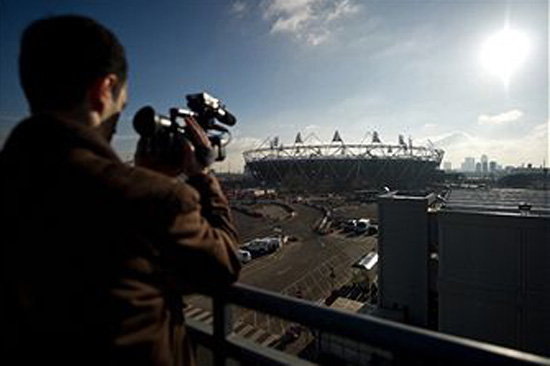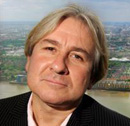By Andrew Warshaw
January 19 – Mike Lee (pictured), the man leading Tottenham Hotspur’s public relations campaign to take over the Olympic Stadium after London 2012, insists legacy will form a crucial part of the club’s detailed proposals and rejects growing claims they are merely being driven by money.
Tottenham are vying with West Ham to move to the Stratford venue after the Games.
Both have to submit their respective bids for a 60,000-seater stadium to the Olympic Park Legacy Company (OPLC) by close of play on Friday.
Tottenham’s other option is to remain at a revamped White Hart Lane, their traditional home.
Initial planning permission has already been given for a new 56,000-seater stadium but with costs becoming prohibitive, along with the demands of the local authority, Spurs have switched their focus to moving from north to east London.
The club have been swimming against the tide of public opinion, with fans opposed to moving to a different part of London and a string of high-profile track and field officials lambasting plans to get rid of the Olympic athletics track.
Former Olympic hurdler Alan Pascoe, who was vice-chairman of London 2012 during the successful bid, claims Britain’s reputation would be ruined if OPLC rules in favour of Tottenham and has even called on prime minister David Cameron to intervene to stop the country becoming a “laughing stock”.
But in an exclusive and wide-ranging interview, Lee hit back, insisting the OPLC had a duty to base its recommendation on the long-term benefits of the area rather than purely on emotional factors.
Calling for what he described as a “genuine, open and informed debate” over the future of the Olympic site, Lee insisted Tottenham’s bid to the OPLC would embrace a strong element of legacy despite all the criticism.
“Let’s cut through some of the emotion and focus on what is viable and sustainable,” said Lee.
“As more becomes known about our proposal, it will become very clear Spurs have given a lot of thought to legacy.”
Citing the club’s proposed partnership with AEG, Lee said: “They have a tremendous track record of success.
“Look at the Millennium Dome.
“They have turned it from a huge white elephant into one of the best arenas and event and leisure spaces in Europe.”
If Spurs get the go-ahead, said Lee, the same kind of legacy would be applied to the Olympic site in terms of multi-sport and leisure activities in and around a football stadium, enhanced by the Tottenham Hotspur Foundation’s wide-reaching community activities.
The doyen of spin doctors, Lee was communications director of the London 2012 bid and a West Ham board member under the club’s previous owners.
He denies there is any conflict of interest with either role and says he always believed Tottenham’s proposal represented the best way forward once it became clear that the Olympic Stadium was not necessarily going to be used for athletics after the games.
Spurs have offered to invest in grass-roots athletics by modernising the now-antiquated Crystal Palace stadium and restore it to its former glories.
“The bid book on the issue of the Olympic stadium is very clear in stating that the proposed legacy was a 25,000-seat stadium, with athletics at its core,” Lee said.
“That’s in an ideal world.
“Over two years, discussions took place about finding tenants and funding partners to support that form of stadium in legacy mode.
“When it was taken to the market place, no such business partners or anchor tenants came forward.”
 Lee disclosed Bromley Council were “very interested” in Tottenham’s Crystal Palace proposal and dismissed the idea that the project could die on its feet if the venue instead becomes the new home for Crystal Palace football club, as is being mooted.
Lee disclosed Bromley Council were “very interested” in Tottenham’s Crystal Palace proposal and dismissed the idea that the project could die on its feet if the venue instead becomes the new home for Crystal Palace football club, as is being mooted.
“The same proposal has come forward in the past and has always been rejected by the planning authority and local residents,” said Lee.
“The Crystal Palace site is certainly in need of investment and regeneration but it is clearly a site that lends itself to athletics.
“If it’s about purely developing a football stadium within Crystal Palace itself, that has got major obstacles.”
Lee repeated Tottenham’s stance – backed up by several independent architects and experts – that the Olympic Stadium could not embrace both top-class football and an athletics track, a combination rapidly becoming a thing of the past throughout Europe but which West Ham would carry through.
“We must not create the danger of a white elephant,” said Lee.
“We know what works in this country in terms of atmosphere and the fan experience.
“And what would athletics do with a 60,000-seat venue?”
Lee, who also played a prominent role in Rio de Janeiro’s 2016 Olympic bid victory, denies he has cynically switched sides after being an integral part of London 2012.
“I’ve always had concerns and doubts about the whole Stadium and legacy issue.
“When Spurs came into the mix, without any conversations with them, I thought it could be very interesting.”
He says those who criticise his and Tottenham’s approach don’t understand the way Olympic preparations work.
Paying tribute to Sebastian Coe and the rest of the London 2012 team with whom he once worked, he nevertheless said it was natural for plans to evolve.
“London 2012 will be a magnificent success under Seb and his team but it’s not going to be exactly as it’s written in the bid book – that’s normal.
“One of the things I have learned working in the Olympic Movement is that legacy means having stadiums and Olympic parks that are viable in the medium and longer term.
“If you look at the way bid books are put together and what is delivered seven years down the line, there are always changes.
“When you come down to implementing, you have to make adjustments.
“If you end up being stuck without evolving, you end up with white elephants.”
Contact the writer of this story at zib.l1745214670labto1745214670ofdlr1745214670owedi1745214670sni@w1745214670ahsra1745214670w.wer1745214670dna1745214670
Related stories
January 2011: Javelin star Sanderson excluded from Spurs/West Ham
January 2011: If Spurs get Olympic Stadium it “would·destroy the whole idea” of London 2012 claims bid star
January 2011: Spurs bid to move into Olympic Stadium suffers major setback with new Crystal Palace plans
January 2011: Exclusive – Bolt and Caborn add backing to West Ham Olympic Stadium plans
January 2011: Exclusive – Chairman Warner denies UK Athletics “refusing to engage” with Tottenham

